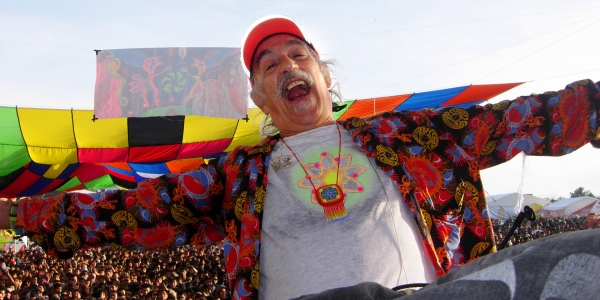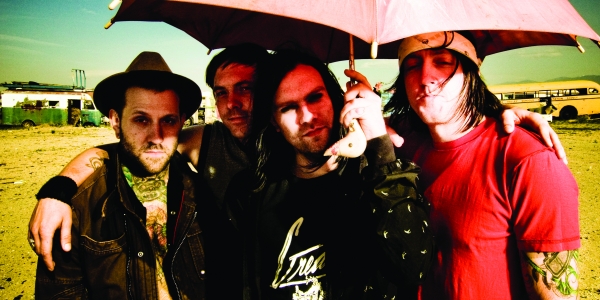However, Ram is perhaps most widely recognised for the ambient psychedelia he and Simon Posford have been making since the mid-‘90s under the name Shpongle. On the cusp of his 73rd birthday, Raja Ram will be back in Australia to showcase the two sides of his late-career personality, headlining next week’s Earthcore 20th Anniversary event.
“On the Saturday night I’m doing a Shpongle DJ set and then on the Sunday I’m closing the party with my full-power banging set,” he says. “One is quieter, that’s the Shpongle set, and the full-on one’s going to be, I hope, where everybody takes their shoes off and gets crazy.”
Although the comprehensive Shpongle live show won’t be on display at the festival, Ram assures that the Earthcore audience will still be treated to an immersive Shpongle experience.
“When it says ‘Shpongle DJ set’, I’ll only play Shpongle music, from the last five albums. I don’t do any auxiliary instrument along with that performance. I’m just playing it on CDs – there’s nothing but my moustache and the creation that I’ve done with Simon Posford.”
Shpongle’s fifth album Museum of Consciousness came out in late July and is characterised by the duo’s trademark calming eccentricity. The record is a densely layered artefact, featuring a number of extended compositions with titles such as The Aquatic Garden of Extra-Celestial Delights and Ram details the massive effort that goes into making a Shpongle record.
“Our albums take forever to make. I can make a trance record in two weeks with 1200 Micrograms. With Shpongle I think the quickest we’ve ever done is three years, and that’s just to make seven tracks! It’s not because we’re slow, it’s because the music is incredibly intricate; we’ve got up to maybe 300 different layers of sound per track. It’s just extremely technical and complicated music.”
Although Shpongle is a two-man project in the studio, executing the recorded sounds onstage requires an enormous assemblage of musicians and performers. Due to the complexity of the onstage arrangement Ram explains that Shpongle live shows are actually somewhat rare.
“We do about three or four a year, big shows, because it’s too massive. The Shpongle full show is a mighty difficult beast to tame and put on because there’s just so many people and it’s such a big production. Seventeen people onstage, acrobats and the whole business – it’s a giant show.”
Museum of Consciousness has been well received by Shpongle’s longstanding supporters and the band’s curious universe continues to recruit new listeners. Ram relates that the record’s strong sales performance will send the entire touring lineup to some prestigious and unexpected locations across the globe.
“This will certainly be our biggest seller worldwide and because of it we’re getting some phenomenal offers coming in around the world to play at various events. The venue in America called Red Rocks, which is an amphitheatre in Colorado – around 12,000 people outdoors with a view of the Rocky Mountains and the sunsets. It’s the best venue in America without doubt; we’re going out there in May next year. We’ve got Russia and Israel and many things really taking off for us.”
Shpongle’s popularity has been on a steady incline since the release of their 1999 debut Are You Shpongled? Although at a glance their music might appear to have merely niche appeal, Ram reports that their unique genre fusion attracts fans from a wide range of ages and cultures.
“Children like it, grandparents like it – I went to my dentist the other day in London and he was playing it. Trance music and all the other genres are in a very limited corral of people listening to them. With Shpongle, it seems to have an amazing crossover and wherever you go in the world, whether it’s India or Australia, people are sitting on their hammocks or sitting around in their living rooms playing Shpongle.”
The fact that their music transcends the usual demographic boundaries is a true vindication of the experimental impulse that gave rise to Shpongle in the first place. Ram reveals the genesis of Shpongle’s sonic idiosyncrasies.
“We just wanted to do something that we heard in our heads and try to recreate that psychedelic experience without the use of drugs. So we had to delve very deep into our own psyche and consciousness to extract that information and then realise it and manifest it through music, which is quite difficult. You may have a great idea but to put that idea out and make it musical is quite a challenge.”
Despite this admitted difficulty, Ram goes on to state his belief that Shpongle have achieved something musically unprecedented.
“I think we’ve created a new genre with this music because certainly nobody else is doing it in the world and we’ve hit upon a very rich seam of minerals and jewels that we can distribute.”
Shpongle’s specific yet almost intangible artistic vision – to aurally project the sensations of a psychedelic trip – evidently necessitates a crafty creative approach. Ram indicates that their songs largely stem from feeling rather than technique.
“We often go into the studio and we don’t work on a musical level, though we’re both trained classical musicians. I’ll say, ‘Look there’s a shimmering lake up in the sky and something comes out of the water, a Goddess, and then we have a conversation,’ and so forth. It’s very visual imagery but we convert that into sound. It’s a strange way of working for sure,” he explains.
The results are indeed fascinating and Museum of Consciousness possesses the capacity to lure in and intoxicate the listener. Ram is pleased about the band’s ever-increasing following but accruing a massive fanbase was never their major intention.
“It’s artistically satisfying and that’s what we set out to do. I’m thrilled that people love it and it’s selling and it’s on a snowball effect, but that really wasn’t the motivation behind it,” says Ram. “The motivation’s really to make something with me and Simon that really excites the both of us and we can find some new directions to go in every album and then share it with the world.”
The Shpongle organism continues to evolve and Ram is very excited to return to his home country and share the latest Shpongle sounds with the Earthcore audience.
“I’m just thrilled to be able to come back and share it with my fellow Australians and have a great time and meet everybody again. It’s an amazing privilege and I want to say thank you to Spiro who is the best promoter and I’ll do my very best to make it a great show for you all.”
BY AUGUSTUS WELBY

